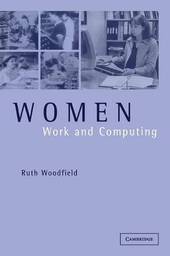
|
Women, Work and Computing
Paperback / softback
Main Details
| Title |
Women, Work and Computing
|
| Authors and Contributors |
By (author) Ruth Woodfield
|
| Physical Properties |
| Format:Paperback / softback | | Pages:222 | | Dimensions(mm): Height 229,Width 153 |
|
| Category/Genre | Ethical and social aspects of computing |
|---|
| ISBN/Barcode |
9780521777353
|
| Classifications | Dewey:305.43 |
|---|
| Audience | | Tertiary Education (US: College) | | Professional & Vocational | |
|---|
| Illustrations |
Worked examples or Exercises
|
|
Publishing Details |
| Publisher |
Cambridge University Press
|
| Imprint |
Cambridge University Press
|
| Publication Date |
28 December 2000 |
| Publication Country |
United Kingdom
|
Description
Although few dispute the computer's place as a pivotal twentieth century artefact, little agreement has emerged over whether the changes it has precipitated are generally positive or negative in nature, or whether we should be contemplating our future association with the computer more with enthusiasm or trepidation. Specifically with regard to the relationship between women and computers, a diverse body of commentary has embraced the views of those who have found grounds for expressing pessimism about this association and those who have favoured a more optimistic assessment of the current situation and its probable future development. This book undertakes a thorough evaluation of the legitimacy and predictive power of the optimistic commentary. Using a large body of original qualitative data, it interrogates the bases of what it identifies as three waves of optimism and in doing so provides answers to some of the key questions asked in this field today.
Author Biography
Ruth Woodfield is Lecturer in Sociology at the School of Social Sciences, University of Sussex.
Reviews'Woodfield's discussion of her research and her detailed analysis of her interviews with Softech employees provides a fascinating window into an intense and highly selective work environment. This together with her discussion of the nature and validity of ethnographic work makes this book an excellent model for post-graduate research students designing similar studies of work environments.' Sociology
|